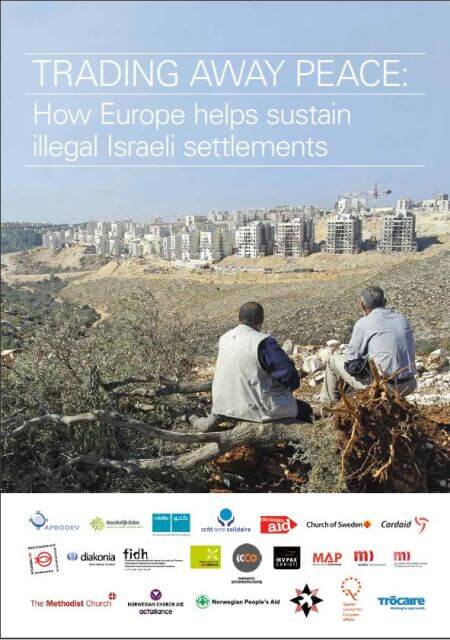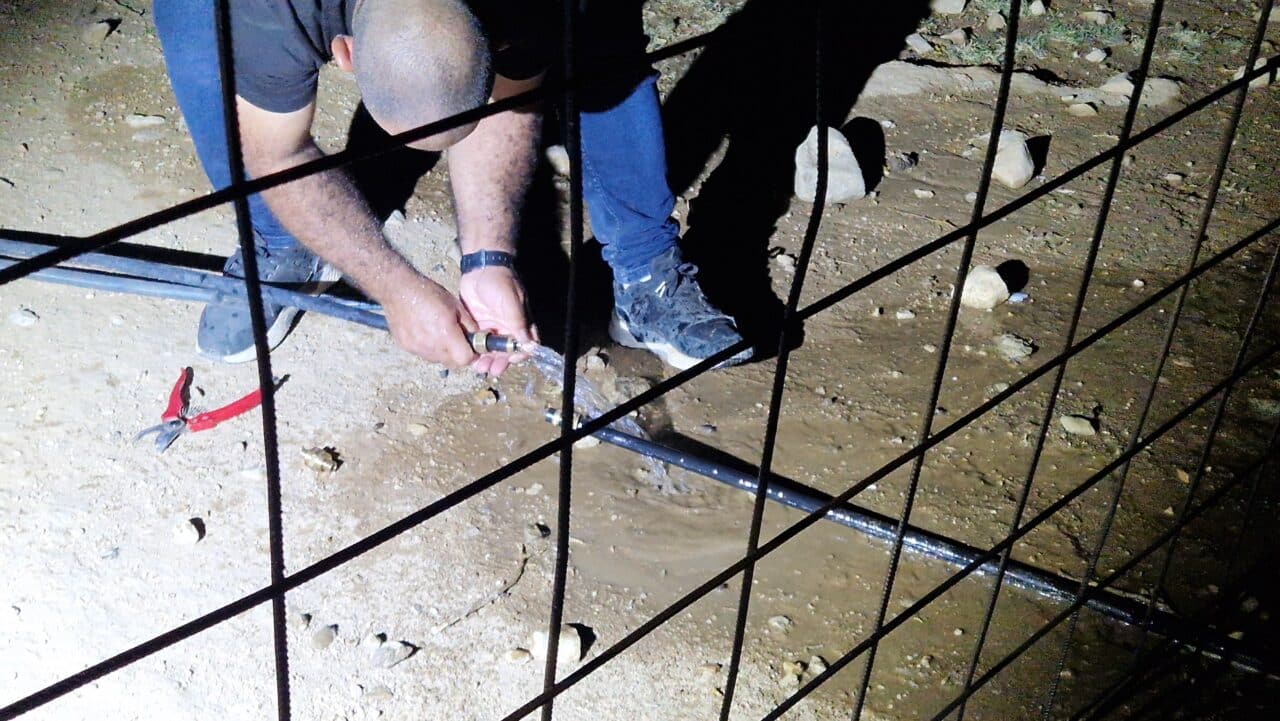Trading Away Peace: How Europe helps sustain illegal Israeli settlements
 This report, which draws heavily on the experience of communities in the Jordan Valley, calls on European governments to adopt a range of concrete measures to stop assisting settlement expansion and close the gap between words and practice.
This report, which draws heavily on the experience of communities in the Jordan Valley, calls on European governments to adopt a range of concrete measures to stop assisting settlement expansion and close the gap between words and practice.
Jordan Valley Solidarity welcomes the report, and considers it a brave step from the NGOs involved. We hope that this campaign will carry on and grow to challenge the economic project of the illegal colonies. This settlement economy is directly involved in stealing the natural resources in the Occupied Territories, especially the Jordan Valley.
At the same time, we urge all those struggling for justice not to forget that there are other, very well-known and influential organisations who have not supported this report. We are wondering why they did not participate.
More so, we are calling on the NGOs who published this report to take practical steps in implementing the recommendations of the report and to challenge the occupation in their domestic courts.
Many reports do not reach beyond the UN shelves, and we do not want this report to be one of them. Also, we are concerned that no Palestinian or regional NGOs have participated to stop Israel profiting from the Arab markets, especially the Jordan Valley – the second biggest market for Israel for specific agricultural products, like herbs, grapes, vegetables and dates.
Further, those who are supporting the Palestinian struggle need to be aware that most of the investment coming through international donors goes to the Palestinian private sector and becomes a normalisation project, which helps to sustain the colonies and avoid the Boycott Divestment and Sanctions movement.
Full report available on the Christian Aid website at: http://www.christianaid.org.uk/Images/Trading%20Away%20Peace%20October%202012_tcm15-63607.pdf
The following press release was published on 30th October 2012 to launch the report:
The European Union imports fifteen times more from Israel’s illegal settlements in the Occupied Palestinian Territory than from Palestinians themselves, a new report [1] from a coalition of 22 non-governmental organisations including the International Federation for Human Rights (FIDH), Christian Aid UK and Ireland, and Diakonia revealed today.
The report, entitled “Trading Away Peace: How Europe helps sustain illegal Israeli settlements“, is the first to compare available export data from Israeli settlements and Palestinians, highlighting the inconsistency at the heart of EU policy. The EU states, “settlements are illegal under international law, constitute an obstacle to peace, and threaten to make a two-state solution impossible” [http://www.consilium.europa.eu/uedo…” id=”nh2″>2], but continues to provide a primary export market for settlement products. Most EU Member States have failed to ensure products are correctly labelled in stores, leaving consumers unaware of the products’ true origin, contrary to the EU’s own directives [http://www.europarl.europa.eu/sides…” id=”nh3″>3].
“Europe says settlements are illegal under international law and yet continues to trade with them. Consumers are unwittingly contributing to the injustice by buying products that are inaccurately labelled as coming from Israel when in fact they are from settlements in the West Bank,” said William Bell, Policy and Advocacy Officer at Christian Aid UK and Ireland.
The report, which has a foreword by the former EU Commissioner for External Relations, Hans van den Broek, calls on European governments to adopt a range of concrete measures to stop assisting settlement expansion and close the gap between words and practice. At a minimum, the coalition is calling for clear labelling guidelines to ensure European consumers do not unknowingly buy settlement goods [4]. Such guidelines already exist in the UK and Denmark and are under consideration in several other member states including Sweden and Finland [5].
Trade with settlements has been on the EU agenda since May, when EU Foreign Ministers strongly criticised “the marked acceleration of settlement construction” and for the first time called for full application of existing EU legislation regarding products from settlements [6].
The Israeli government estimates the value of EU imports from settlements at around €230m a year [7]; compared to €15m a year from Palestinians [http://trade.ec.europa.eu/doclib/do…. With (…)” id=”nh8″>8]. The discrepancy is partly driven by Israel’s policy of providing large subsidies to settlers [9], including for infrastructure, business development, and agriculture while imposing stringent restrictions on the Palestinian access to markets and resources.
Settlers enjoy easy access to international markets, and have established modern agribusinesses and industrial zones. In contrast, the Palestinian economy is “severely constrained by a multi-layered system of restrictions” [10] imposed by Israel, including roadblocks, checkpoints and limited access to land, water, and fertilisers. As a result, Palestinian exports have fallen from over half of GDP in the 1980s to less than 15% of GDP in recent years [11], effectively invalidating the EU’s preferential trade agreement with the Palestinians.
“The EU spends hundreds of millions of euros in aid each year to support Palestinian state building but then undermines this assistance by trading with illegal settlements, thus contributing to their viability and expansion,” said Dr Phyllis Starkey, former British MP and Trustee of Medical Aid for Palestinians.
Among the settlement goods that are on sale in Europe are dates, grapes, citrus fruits, herbs, wines, cosmetics from Ahava, some of the carbonation devices from SodaStream and some of the plastic garden furniture produced by Keter.
“Goods from West Bank settlements are produced on the back of house demolitions, land confiscations, and military occupation. Governments need to finally move beyond rhetorical condemnations of settlements and at the very minimum ensure consumers can make informed decisions about these products in shops. This is nothing but abiding by European and international law,” said Souhayr Belhassen President of the International Federation for Human Rights (FIDH).
Footnotes
[1] With more than 4 million Palestinians and over 500,000 Israeli settlers living in the Occupied Territory this means the EU imports over 100 times more per settler than per Palestinian. Source of figures: see below.
[2] E.g. here: http://www.consilium.europa.eu/uedo…
[3] http://eur-lex.europa.eu/LexUriServ…; http://www.europarl.europa.eu/sides…
[4] Further, more comprehensive measures recommended in the report include: • excluding settlements from benefits of bilateral agreements and cooperation programmes • actively discouraging corporate involvement in settlements • preventing financial transactions to settlements • banning imports of settlement products
[5] The guidelines should be extended to also cover non-food products. UK guidelines issued in December 2009: http://archive.defra.gov.uk/foodfar… . Danish guidelines just issued on 5 October 2012: http://www.foedevarestyrelsen.dk/Fo…
[6] http://www.consilium.europa.eu/uedo…, p. 12.
[7] Figure provided by the Israeli Foreign Ministry to the World Bank in 2012, represents approximately 2% of total Israeli exports to the EU. See: http://siteresources.worldbank.org/…, p. 13.
[8] 5-year average for 2007-2011. http://trade.ec.europa.eu/doclib/do…. With more than 4 million Palestinians and over 500,000 Israeli settlers living in the Occupied Territory this means the EU imports over 100 times more per settler than per Palestinian.
[9] According to a recent estimate, the government spends €330m a year on settlements above the level of benefits provided to citizens inside Israel . http://settlementwatcheastjerusalem…
[10] http://siteresources.worldbank.org/…, p.11.
[11] http://www.imf.org/external/country…, p. 4.


